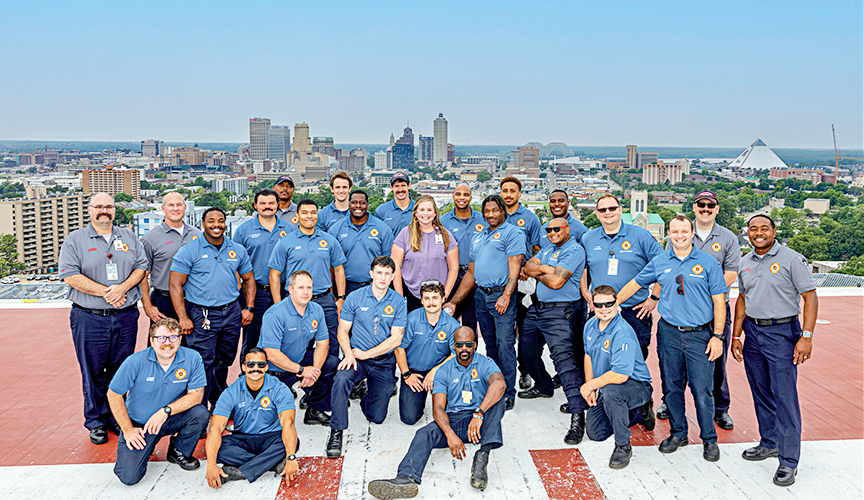Specialized Education for Exceptional Outcomes
A paramedic sat in the floor of Le Bonheur Children’s Hospital’s Emergency Department (ED) in tears. The individual with Memphis Fire Department had responded to a call of a very sick child and brought them to Le Bonheur. But the outcome for the child took a turn for the worse. The paramedic was desperate to know how to take better care of these kids in emergency situations.
This scene that Senior Director of Emergency Services Barbara Stewart, MSN, RN, CNL, NE-BC, and Emergency Department Clinical Educator Stephanie Foster, MSN, RN, CPEN, watched unfold was proof of what they already knew — emergency medical technicians (EMTs) and paramedics were thirsty for pediatrics-specific knowledge, and Le Bonheur had the ability to provide hands-on education to improve chances for kids transported to their ED.
Thanks to a partnership with Memphis Fire Department, emergency medical services (EMS) responders of all levels now have hands-on clinical rotations within Le Bonheur’s ED. The education obtained, relationships built and confidence gained is paving the way for better outcomes for children.

Le Bonheur’s partnership with Memphis Fire Department brings emergency medical services (EMS) responders of all levels to the hospital for hands-on clinical training in Le Bonheur’s Emergency Department. Pictured here at orientation, EMS providers gain valuable training for the specific needs of pediatric patients.
“Our job is to ensure that these professionals can take care of kids,” said Stewart. “At Le Bonheur, patients will get expert care, but it’s important for EMS providers to have a level of comfort and skill to initiate interventions early for the best possible outcome.”
During the clinical rotations, EMS responders work an 11 a.m. to 11 p.m. shift, which allows them to see the flow of the department and how it changes throughout the day. Their clinical days include time with a nurse or ED technician, physician, child life specialist and respiratory therapist.
Trainees observe and discuss patients and can participate in care within the scope of their training as an EMT or paramedic. This can include practicing assessments with sick or healthy kids, conducting electrocardiograms and starting IVs, depending on the level of training.
In addition to hands-on medical training with children, they also learn the soft skills of working with kids, such as how to talk to different ages and development levels and interact with them accordingly. And all of the training is infused with the Le Bonheur culture with the aim of making EMS providers a part of the greater Le Bonheur Emergency Medicine team.
Foster and Stewart say that the results of these clinicals are immediate. They have watched EMS providers grow more confident in their interactions with kids after just one day of clinical training. EMS providers are less fearful of bringing in really sick kids and have saved lives because they trained with Le Bonheur’s ED team, says Foster.
“Pediatric patients walk a fine line, and what EMS providers initiate can make or break an outcome,” says Foster. “Focused pediatric care from EMS can make a difference, and our goal is that these providers don’t just support Le Bonheur’s care — they are an extension of it.”
This education creates the opportunity for EMS providers to build relationships with the physicians, nurses and ED technicians who will assume a child’s care after transport by EMS. Foster says that the program is reigniting excitement within the staff at Le Bonheur. The excitement of an EMS provider who successfully implemented what they have learned while training is contagious, and the training program has encouraged involvement and teamwork from all areas of the department.
Stewart and Foster hope that the program will continue to expand so that Le Bonheur becomes the primary location for hands-on pediatric training in the Memphis area for EMS providers. They also would like to bring the program to other facilities within the Methodist Healthcare system who, although not pediatric hospitals, still see children in their EDs.
“A career as an EMS provider can be a rough occupation, but clinicals with us allow these providers to build confidence with kids,” said Foster. “It shows why pediatrics is a joy — they can build connections and act silly with kids while providing excellent care.”
Help us provide the best care for kids.
Le Bonheur Children's Hospital depends on the generosity of friends like you to help us serve 250,000 children each year, regardless of their family’s ability to pay. Every gift helps us improve the lives of children.
Donate Now
















